When it comes to keeping your vehicle running smoothly, few things are as important as choosing the right oil filter. Trust me, I’ve tried my share of filters, but I keep coming back to one name: the WIX XP Oil Filter.
If you care about performance, durability, and overall engine health like I do, this filter is definitely one you should consider. But don’t just take my word for it—let me share why this oil filter might just be your new go-to.
In this article, I’ll break down the key points about the WIX XP oil filter, give you some real-world pros and cons, and even compare it with other big names on the market.
Whether you’re a long-time gearhead or someone new to DIY vehicle maintenance, I’ll walk you through everything you need to know to make an informed decision.
Why Buy The WIX XP Oil Filter?
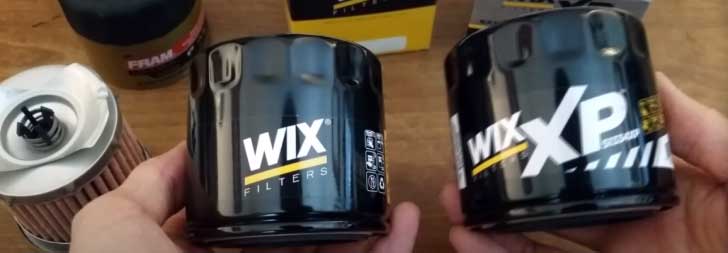
Before we even get into the nuts and bolts of how this filter works, let’s answer the burning question: Why should you buy it?
- Engine Longevity: If your engine is your car’s heart, then the oil is its lifeblood. Using a high-quality oil filter like the WIX XP ensures that your engine stays clean, reducing wear and tear, which can save you a lot of money in the long run.
- Superior Filtration: The advanced synthetic media of the WIX XP is designed to capture more contaminants, which means your engine gets cleaner oil for a longer period. You’ll notice smoother performance and better fuel efficiency over time.
- Durability: One of the biggest advantages of the WIX XP is its ability to last. If you’re someone who racks up a lot of miles or drives under tough conditions, you’ll appreciate that this filter can handle the job. It’s built to last and perform in heavy-duty environments.
- Perfect for Long-Lasting Oil: These days, many of us are switching to synthetic or high-mileage oils that promise longer intervals between oil changes. The WIX XP is specifically designed to work with those oils, meaning you won’t have to worry about your filter failing before your next oil change.
Now that we know why you should consider buying it, let’s explore some of the pros and cons based on real experiences—both mine and others.
Pros of The WIX XP Oil Filter
- High Filtering Efficiency
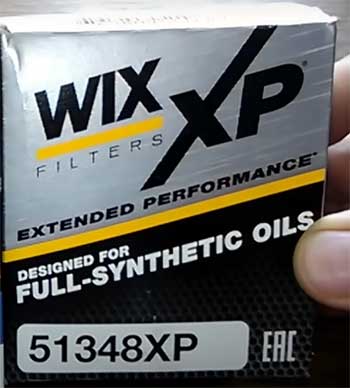
The standout feature of the WIX XP oil filter is its advanced synthetic filtering media, which traps up to 99% of harmful contaminants.
That’s significantly higher than many standard filters, and it’s something I’ve definitely noticed.
After using this filter, my engine runs noticeably smoother, and the oil stays cleaner for longer.
You don’t even have to be a car expert to see the difference in performance.
- Longer Service Intervals
If you’re like me, you don’t want to be under the hood every few months.
With the WIX XP filter, you can stretch your oil changes a little longer, especially if you’re using synthetic oil.
This filter is designed to handle extended intervals without losing efficiency. It’s a time and money saver in the long run.
- Tough Construction
I’ve used plenty of filters that felt flimsy right out of the box—not the WIX XP. From the first time I held it, I could tell this was a well-made product. The outer casing is solid, and the gasket fits snugly, meaning there’s no leaking, even under high-pressure conditions.
If you drive a high-performance vehicle or haul heavy loads, you need something that can stand up to the job, and this filter absolutely delivers.
- Great for High-Performance Engines
I’m a bit particular about my engine, and if you’re driving a high-performance vehicle, you probably are too. The WIX XP filter is specifically designed for engines that operate under more extreme conditions, whether that’s higher RPMs or heavier loads.
In my case, I’ve noticed improved throttle response and overall engine performance after switching to this filter.
Also Read: Is Doc’s Diesel Filter Any Good?
Cons of The WIX XP Oil Filter
- Price Point
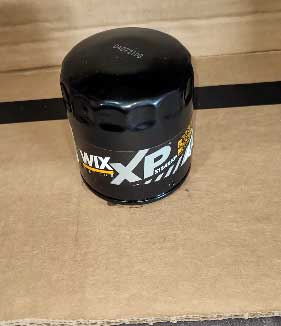
Now, the WIX XP isn’t the cheapest oil filter out there.
If you’re used to grabbing whatever is on sale at the local auto parts store, the price tag on this filter might give you pause.
But remember, you get what you pay for.
This filter is designed for longevity and high performance, so if that’s what you need, it’s worth the investment.
- Availability
This might not be a dealbreaker for everyone, but I’ve found that the WIX XP can sometimes be harder to find, especially if you’re looking for a specific model.
It’s not always stocked at the smaller auto parts stores, and you may need to order it online or go to a specialty retailer.
It’s a small hassle, but once you’ve got one, you’ll see why it’s worth the effort.
- Not for Every Vehicle
The WIX XP is ideal for high-performance engines and heavy-duty vehicles, but if you’re driving a commuter car or something that doesn’t see a lot of action, you might not need this level of protection.
It’s probably overkill if you’re just cruising around town. For those vehicles, you could save some money by going with a standard WIX filter instead.
Tips For The WIX XP Oil Filter
When it comes to maintaining your WIX XP oil filter, there are a few key tips to ensure you get the most out of it:
- Stick to Your Oil Change Schedule: Even though the WIX XP allows for longer intervals between changes, it’s still important to follow your vehicle’s recommended maintenance schedule. Keeping an eye on oil levels and overall engine performance can help you avoid any potential issues.
- Check for Leaks: While the WIX XP is built tough, it’s always a good idea to double-check for any leaks after installation. A properly seated gasket is crucial, and ensuring the filter is snug will prevent any drips.
- Match with High-Quality Oil: Since the WIX XP filter is designed for longer intervals, pairing it with a high-quality synthetic oil will maximize its benefits. You’ll notice smoother engine performance and better fuel efficiency when the two work together.
- Inspect During Each Change: Whenever you change your oil, give the filter a once-over to make sure there’s no damage or wear. While the WIX XP is built to last, it’s always good practice to inspect any part that’s responsible for your engine’s health.
Comparison: WIX XP Vs. Other Brands
When choosing the right oil filter, it’s natural to want to know how the WIX XP stacks up against some other well-known options like the HP Oil Filter, Purolator Oil Filter, and K&N Oil Filter. I’ve tried each of these filters over the years, so here’s how they compare based on real-world use.
- WIX XP Vs. HP Oil Filter
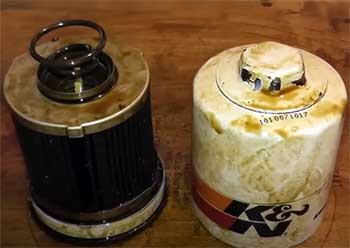
HP oil filters are commonly associated with heavy-duty use, much like the WIX XP, but there are some notable differences.
The HP Oil Filter is designed to withstand high-pressure conditions, which makes it a popular choice for performance vehicles and racing enthusiasts.
However, in terms of filtration efficiency, the WIX XP pulls ahead.
The XP’s synthetic filtering media offers superior contaminant capture compared to the standard media used in most HP filters.
In my experience, the HP Oil Filter works well in high-pressure scenarios, but if you’re looking for something that provides a longer service life with extended oil change intervals, the WIX XP is the better choice.
Additionally, HP filters are more expensive, but they don’t necessarily offer a corresponding boost in filtration performance, which makes the WIX XP a better value in my book.
- WIX XP Vs. Purolator Oil Filter
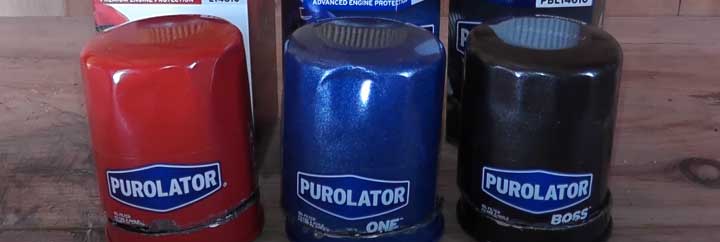
Purolator is another well-known name in the oil filter game, and while they offer solid performance for everyday driving, they don’t quite reach the same level as the WIX XP when it comes to durability and long-term efficiency.
The Purolator Oil Filter is a great budget-friendly option, and it works well for standard vehicles that aren’t subject to extreme driving conditions.
Where the WIX XP shines over the Purolator is in its ability to handle high-mileage vehicles and synthetic oil. If you’re someone who likes to push their oil change intervals or drive in harsher environments, the Purolator filter might need to be swapped out sooner than the WIX XP.
From my own experience, Purolator filters get the job done for day-to-day driving, but if you’re looking for the kind of performance you can set and forget, the WIX XP is the better option.
- WIX XP Vs. K&N Oil Filter
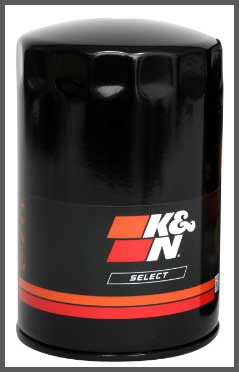
K&N filters are popular among performance enthusiasts, and for good reason. The K&N Oil Filter is built tough, often using heavy-duty canisters that can withstand high pressure and heat.
One unique feature of K&N filters is their nut welded to the top, which makes removal easier—something I do appreciate. However, when we talk about filtration efficiency, the WIX XP still edges out K&N.
While K&N excels at filtering large particles, I’ve found that the WIX XP does a better job of trapping smaller contaminants, especially over extended intervals.
One major draw for K&N is their reputation for being reusable.
If you’re someone who’s concerned about sustainability, the reusable feature of the K&N might appeal to you. But that comes with the added responsibility of cleaning the filter between oil changes.
For someone like me, who prioritizes convenience along with performance, the WIX XP’s high filtration efficiency and no-maintenance design make it a clear winner. Plus, K&N tends to be pricier, and while it’s a solid option for performance drivers, I prefer the WIX XP’s balance of durability and cost-efficiency.
Frequently Asked Questions (FAQs)
The “XP” stands for extra protection. These filters are designed with synthetic media that provides superior filtration, making them ideal for heavy-duty and high-performance vehicles.
The WIX XP is designed to last through extended oil change intervals, especially when paired with synthetic oil. Depending on your driving conditions, it can last anywhere from 7,500 to 15,000 miles.
The main difference is the filtering media. The XP version uses synthetic materials that are more efficient at trapping contaminants, while the non-XP versions typically use paper or cellulose-based materials, which are adequate but not as robust for longer intervals or harsher conditions.
In my experience, yes. While Fram filters are good for everyday use, the WIX XP offers better filtration and is built to last longer under more demanding conditions.
Conclusion: Should You Buy the WIX XP Oil Filter?
At the end of the day, if you’re serious about protecting your engine and getting the most out of your vehicle, the WIX XP oil filter is a fantastic investment. It’s built to handle tough conditions, offers superior filtration, and lasts longer than most competitors.
Whether you’re a weekend warrior or someone who depends on their vehicle for heavy-duty work, this filter won’t let you down.
So, go ahead—try the WIX XP filter. Your engine will thank you!

